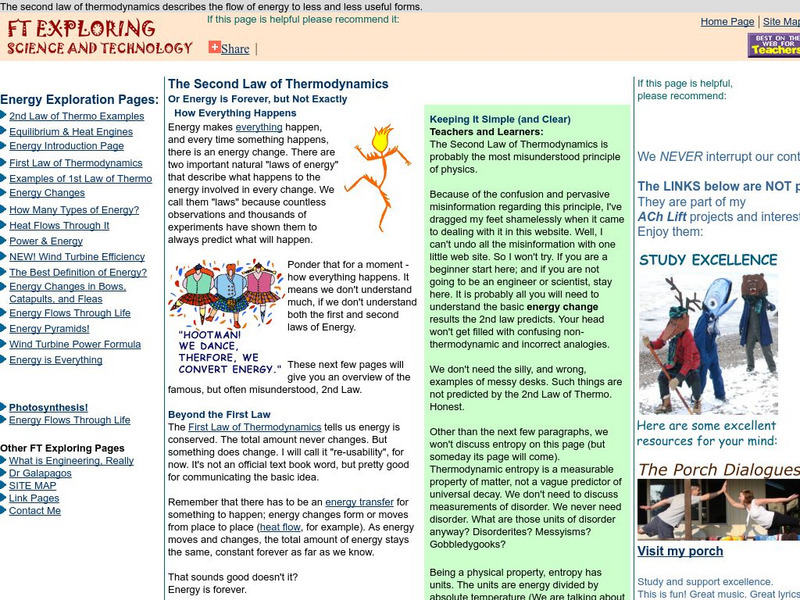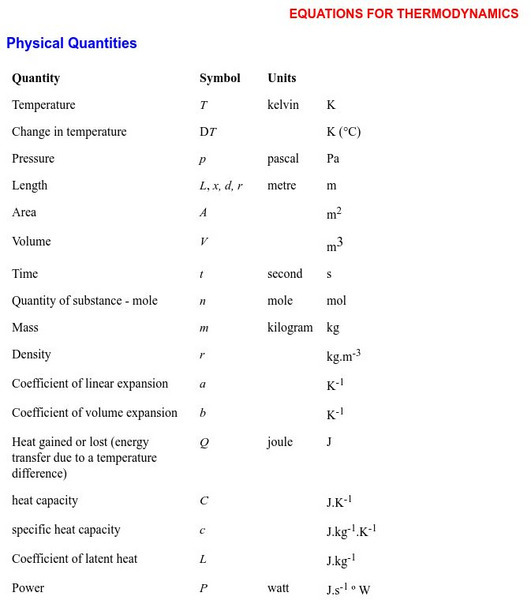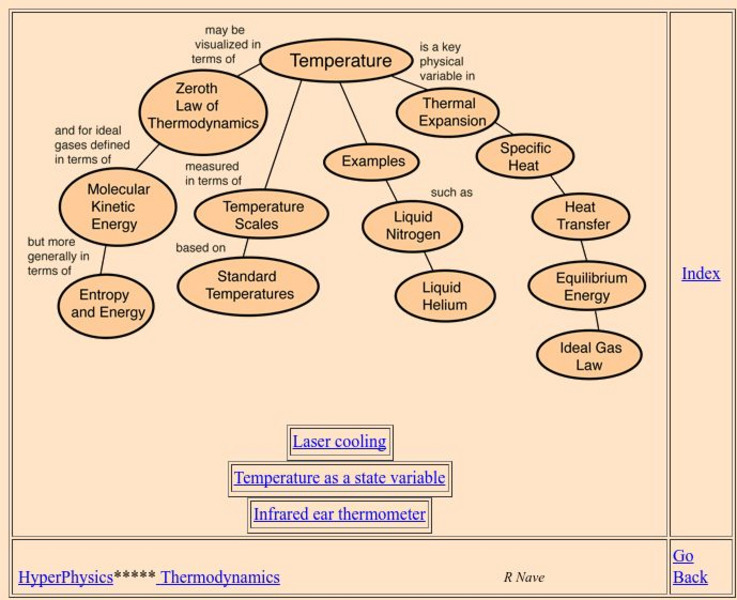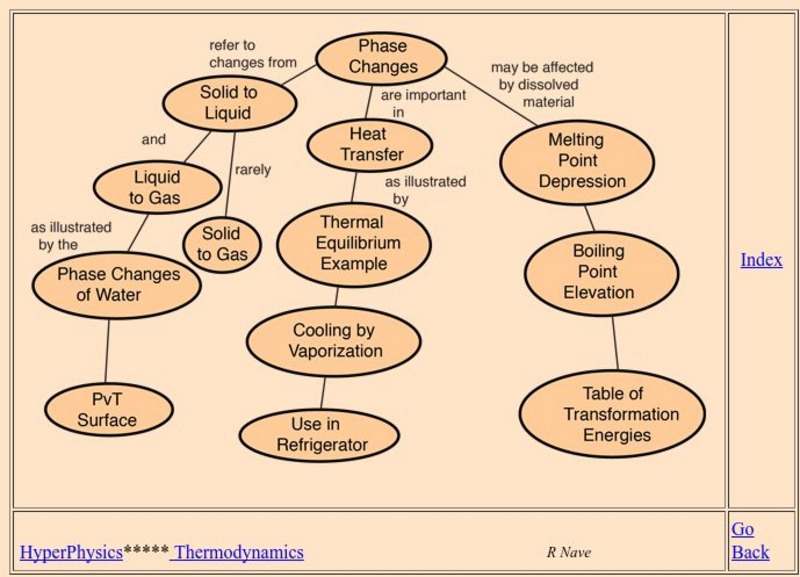BBC
Bbc Schools: Ks2 Bitesize: Science: Materials: Keeping Warm
Easy-to-understand overviews, with illustrations, a game, and quiz questions, about thermal conductors and insulators.
University of Sydney (Australia)
Thermal Physics Module: Ideal Gases [Pdf]
A molecular model of a gas is introduced and explained. Assumptions behind the ideal gas law are presented. The ideal gas law is stated. Charles' law and Boyle's law are derived from the ideal gas law.
Science is Fun
Science Is Fun: The Fireproof Balloon
In this experiment, two balloons are each placed over a lighted match, but the one that has had water placed inside it does not burst. Includes an explanation of why that is so.
Concord Consortium
Concord Consortium: Stem Resources: Greenhouse Light and Temperature
An interactive tool where students can create a model of a greenhouse and use a light sensor to measure the amount of light it receives from a lamp at various times of the day. Temperature is also measured. Data is plotted on graphs,...
Chemistry Collective
Chem Collective: Coffee Problem
Use the virtual lab to determine how much milk to add to hot coffee to reach the desired temperature
American Chemical Society
Middle School Chemistry: Chemical Reactions & Engineering Design
This lesson begins with a story about rescuing reptile eggs from a new construction site. Using the story as motivation, learners are presented with an engineering design challenge: Build a portable device which can warm, support, and...
Climate Literacy
Clean: Climate Change and the Oceans
Students discover the role that the oceans play in climate change, and how climate change affects the oceans. It is lesson eight in a nine-lesson module "Visualizing and Understanding the Science of Climate Change."
Chemistry Collective
Chem Collective: Camping Problem
Measure the enthalpy of a reaction and then create a solution warm enough to cook food.
Georgia Department of Education
Ga Virtual Learning: Chemistry: Thermochemistry
Through informational text, interactive practice problems, online labs, and virtual simulations, students are introduced to the concepts of thermochemistry.
Science Education Resource Center at Carleton College
Serc: Why Is the Earth Still Hot Inside?
In this lesson plan, students conduct heat transfer experiments to investigate why the Earth is still hot at its core, even after billions of years since its formation. They will learn that the rate of heat transfer is dependent on an...
TOPS Learning Systems
Tops Learning Systems: Top Science: Conduction and Convection [Pdf]
Experiment investigating conduction and convection of heat in water.
FT Exploring
Ft Exploring: The Second Law of Thermodynamics
Learn about one of the most misunderstood principles of physics, the second law of thermodynamics.
Exploratorium
Exploratorium: Science Snacks: Pie Pan Convection
In this experiment, students observe what happens when a pan of soapy, colored water is heated. They will see that convection currents cause the fluid to rise and sink in a localized convection cell.
TeachEngineering
Teach Engineering: How Hot Is It?
Students learn about the nature of thermal energy, temperature and how materials store thermal energy. They discuss the difference between conduction, convection and radiation of thermal energy, and complete activities in which they...
Georgia State University
Georgia State University: Hyper Physics: Zeroth Law of Thermodynamics
The principle of thermal equilibrium is discussed and explained. The zeroth law of thermodynamics is stated. Links to several other pages with related information are provided.
PBS
Pbs Learning Media: Phases of Matter: Interactive Lesson
Learn about the three phases of matter, and how the addition and removal of thermal energy (also known as heat) affects them.
Georgia State University
Georgia State University: Hyper Physics: Radiation Cooling of Body
Discusses the means by which the body regulates its temperature. The role of radiation in this process is explained. An equation for calculating the rate at which energy is transferred by radiation is presented. Also, an interactive...
Sophia Learning
Sophia: Identify Enthalpy of Reaction
A video tutorial explaining the enthalpy of a reaction using an energy diagram. [2:42]
University of Sydney (Australia)
Equations for Thermodynamics
An exhaustive list of equations and formulas which are commonly used in thermal physics (including equations for triple point). Equations are organized according to category. Meaning of the symbols is clearly stated.
University of Sydney (Australia)
Entropy and the Second Law of Thermodynamics [Pdf]
A set of printable pdf pages from the University of Sydney's "Thermal Physics Module" site. Entropy is defined and explained conceptually. The mathematical treatment of entropy is introduced. The second law of thermodynamics and its...
Georgia State University
Georgia State University: Hyper Physics: Temperature Concepts
An indexing page which includes links to a wealth of pages detailing the conceptual meaning of temperature. A hypertext format allows the visitor to quickly gain access the desired information.
Georgia State University
Georgia State University: Hyper Physics: Area Expansion
The concept of area expansion is presented and explained. An equation for calculating the amount of area expansion is provided.
Georgia State University
Georgia State University: Hyper Physics: Temperature
A page describing the concept of temperature and temperature scales. An interactive JavaScript form allows the visitor to investigate the relationship between the Kelvin, Celsius and Fahrenheit scales; enter a value and allow the...
Georgia State University
Georgia State University: Hyper Physics: Phase Change Concepts
An indexing page for the HyperPhysics site. This page includes links to a variety of pages at the site which contain information related to phase changes. Each individual page consists of informative graphics and clear explanations.



![Thermal Physics Module: Ideal Gases [Pdf] Handout Thermal Physics Module: Ideal Gases [Pdf] Handout](https://d15y2dacu3jp90.cloudfront.net/images/attachment_defaults/resource/large/FPO-knovation.png)

















